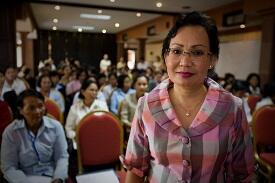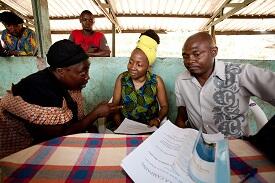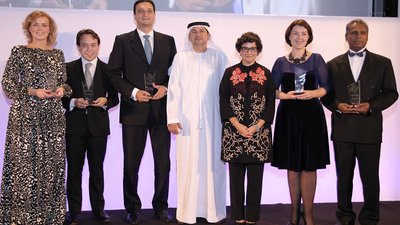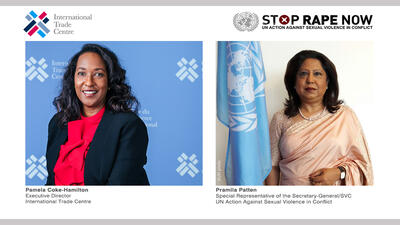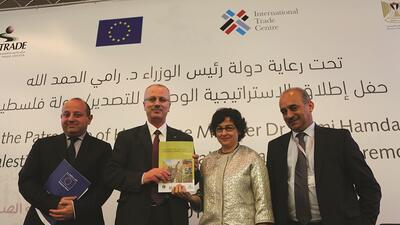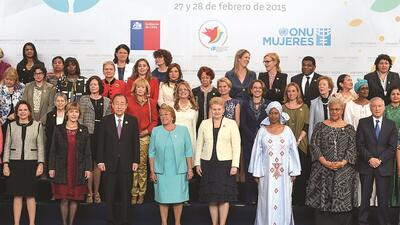Trade Forum Features
Creating networks to empower women
14 January 2013
In recent years, calls for accountability, fairness and openness have galvanized disruptive movements and thinking. From political activism in Tahrir Square to the economic advocacy of the Occupy Movement, the status quo is increasingly challenged and traditional ways of doing business, approaching development and exercising diplomacy are struggling to keep pace with the evolving and complex effects of globalization.
There is also tension between the instant connection and ability to express views that Internet technology theoretically makes possible for all people, and the reality of economic and social inequities that continues to alienate and disadvantage most people. This is a hyperconnected world where people feel removed from the decisions and systems that shape their reality. Women, who are estimated by the United Nations to comprise 70% of the world’s poor, are arguably the farthest removed and the least empowered by current systems. They also stand to gain the most from innovation and restructuring.
To successfully navigate this new world, spark economic resurgence and close the gaps in equity that threaten stability, new thinking and partners are needed, and there must be a new understanding of power and a new leadership paradigm. From Cairo to Wall Street, long-held assumptions about who has power and how it is organized have been rendered defunct by collectives that agitate, mobilize and influence communities. The concept of leadership as an individual’s power to control is fading; as new movements rise up to challenge old orders, people are beginning to reorient and reorganize themselves in relation to their leaders.
In the interconnected world of the 21st century, a distinct brand of leadership is emerging – collective leadership that leverages power for collective empowerment. Effective, sustainable leadership is increasingly seen as a negotiated relationship, not a fixed hierarchy. The need is for collaborative leaders who understand local nuances and global interdependence, and who can work within and through groups to effect change. For more than 15 years, Vital Voices Global Partnership has invested in an expansive and diverse network of women leaders. The non-governmental organization has found that women, often excluded from traditional power structures, are adept at innovating networks to achieve shared goals. With networked access and power, women are better positioned to realize change in their communities and beyond.
In economic development, networks are shown to boost women entrepreneurs’ market access, business growth opportunities and participation in policy making. Networks are among the most pivotal resources an enterprise can leverage for the start-up and growth of a business. Research by the Inter-American Development Bank shows that women entrepreneurs benefit significantly from early-stage strategic assistance and coaching, and that strong early networks encourage women to take risks during the initial phases of a business. The research also shows that the associations women join are a vital source of business and industry knowledge, providing leads on contracts, market information, logistical support, new distribution channels, links to suppliers and investors, and increased access to markets, financing and technology. In certain industries, such as creative and professional business services, in which women are more often concentrated, networks provide an indication of the entrepreneur’s standing and reputation. Ultimately, participation in a network increases the social capital available to an entrepreneur, which can contribute to successful business growth.
Numerous studies show that women’s empowerment and increased economic engagement are some of the smartest investments in long-term growth and development. The World Economic Forum’s Global Gender Gap Report 2011, the World Bank’s World Development Report 2012: Gender Equality and Development, Ernst & Young’s 2009 Groundbreakers, and The Economist Intelligence Unit’s 2012 Women’s Economic Opportunity Index, indicate that women are drivers of the economy, as business leaders, employees, consumers and entrepreneurs. From a global perspective, research in 2010 by the Global Entrepreneurship Monitor, which covers data for 52% of the world’s population and 84% of world GDP, shows that 104 million women started and managed new businesses, adding to the approximately 83 million women who lead businesses launched at least three-and-a-half years earlier. Together, these 187 million women entrepreneurs demonstrate the enormous contribution businesswomen make to economic growth worldwide. Moreover, numerous studies, such as the Goldman Sachs 2009 Power of the Purse: Gender Equality and Middle-Class Spending, suggest that because women tend to spend income on those around them, investing in women produces a multiplier effect, delivering not only increased revenue to local economies, but also better educated children, healthier families and more stable, secure and prosperous communities. The need to invest in women and harness the power and reach of women’s networks is evident.
Vital Voices leverages its global presence to sustain and grow networks of change leaders, offering women opportunities to exchange information, obtain resources and tools, mentor and be mentored, and receive critical training. The organization systematically mobilizes, connects, empowers and supports a targeted group of women leaders so that they, in turn, can be effective catalysts and resources in transforming the conditions of women and vulnerable communities. In the long term, the multiplier effect will not occur only among individuals, but also among networks as they adopt the work of change leaders.
In terms of political participation and human rights, Vital Voices creates opportunities for women to exercise their political voice by enhancing advocacy skills. It also contributes to the creation of an environment free of violence against women and human trafficking by strengthening the implementation of legal frameworks, enhancing women leaders’ capacity to provide services to victims, and changing attitudes and behaviours about gender-based violence. Economic development and entrepreneurship initiatives expand women’s economic engagement and entrepreneurship by increasing access to finance and policymaking, building the capacity of businesswomen’s networks that integrate women into global markets, and developing the next generation of business leaders through mentoring.
Its Businesswomen’s Network model is particularly successful. The idea for the network came from women in the Middle East and North Africa regional network when they convened in 2005 in Tunisia. They saw that through focused connection and collaboration, they could become engines for economic growth, resulting in progress and prosperity for women, their families, communities, regions and the world at large. The Businesswomen’s Network was then formed and has since expanded to include 10 businesswomen’s organizations representing almost 2,500 members. Results include: 478 new businesses started by women participants; 91% of participants reporting benefits to their business as a result of programme participation; and 66% of participants reporting new business connections. In 2009, the Vital Voices regional network in Africa set up a Businesswomen’s Network and in 2011 the Latin America and Caribbean Businesswomen’s Network was launched in Mexico City. As well as building the next generation of women business leaders and entrepreneurs, these networks seek to reduce barriers to economic participation, acting as a unified voice for women advocating for an enabling business environment.
Vital Voices initiatives leverage the organization’s global network of 12,000 leaders in 144 countries to advance security, freedom, equity and peace through sustainable leadership. Vital Voices trains, mentors and connects women, and provides visibility to women who practice transformational leadership, using power to inspire collective empowerment and improve conditions in communities.
To successfully navigate this new world, spark economic resurgence and close the gaps in equity that threaten stability, new thinking and partners are needed, and there must be a new understanding of power and a new leadership paradigm. From Cairo to Wall Street, long-held assumptions about who has power and how it is organized have been rendered defunct by collectives that agitate, mobilize and influence communities. The concept of leadership as an individual’s power to control is fading; as new movements rise up to challenge old orders, people are beginning to reorient and reorganize themselves in relation to their leaders.
In the interconnected world of the 21st century, a distinct brand of leadership is emerging – collective leadership that leverages power for collective empowerment. Effective, sustainable leadership is increasingly seen as a negotiated relationship, not a fixed hierarchy. The need is for collaborative leaders who understand local nuances and global interdependence, and who can work within and through groups to effect change. For more than 15 years, Vital Voices Global Partnership has invested in an expansive and diverse network of women leaders. The non-governmental organization has found that women, often excluded from traditional power structures, are adept at innovating networks to achieve shared goals. With networked access and power, women are better positioned to realize change in their communities and beyond.
In economic development, networks are shown to boost women entrepreneurs’ market access, business growth opportunities and participation in policy making. Networks are among the most pivotal resources an enterprise can leverage for the start-up and growth of a business. Research by the Inter-American Development Bank shows that women entrepreneurs benefit significantly from early-stage strategic assistance and coaching, and that strong early networks encourage women to take risks during the initial phases of a business. The research also shows that the associations women join are a vital source of business and industry knowledge, providing leads on contracts, market information, logistical support, new distribution channels, links to suppliers and investors, and increased access to markets, financing and technology. In certain industries, such as creative and professional business services, in which women are more often concentrated, networks provide an indication of the entrepreneur’s standing and reputation. Ultimately, participation in a network increases the social capital available to an entrepreneur, which can contribute to successful business growth.
Numerous studies show that women’s empowerment and increased economic engagement are some of the smartest investments in long-term growth and development. The World Economic Forum’s Global Gender Gap Report 2011, the World Bank’s World Development Report 2012: Gender Equality and Development, Ernst & Young’s 2009 Groundbreakers, and The Economist Intelligence Unit’s 2012 Women’s Economic Opportunity Index, indicate that women are drivers of the economy, as business leaders, employees, consumers and entrepreneurs. From a global perspective, research in 2010 by the Global Entrepreneurship Monitor, which covers data for 52% of the world’s population and 84% of world GDP, shows that 104 million women started and managed new businesses, adding to the approximately 83 million women who lead businesses launched at least three-and-a-half years earlier. Together, these 187 million women entrepreneurs demonstrate the enormous contribution businesswomen make to economic growth worldwide. Moreover, numerous studies, such as the Goldman Sachs 2009 Power of the Purse: Gender Equality and Middle-Class Spending, suggest that because women tend to spend income on those around them, investing in women produces a multiplier effect, delivering not only increased revenue to local economies, but also better educated children, healthier families and more stable, secure and prosperous communities. The need to invest in women and harness the power and reach of women’s networks is evident.
Vital Voices leverages its global presence to sustain and grow networks of change leaders, offering women opportunities to exchange information, obtain resources and tools, mentor and be mentored, and receive critical training. The organization systematically mobilizes, connects, empowers and supports a targeted group of women leaders so that they, in turn, can be effective catalysts and resources in transforming the conditions of women and vulnerable communities. In the long term, the multiplier effect will not occur only among individuals, but also among networks as they adopt the work of change leaders.
In terms of political participation and human rights, Vital Voices creates opportunities for women to exercise their political voice by enhancing advocacy skills. It also contributes to the creation of an environment free of violence against women and human trafficking by strengthening the implementation of legal frameworks, enhancing women leaders’ capacity to provide services to victims, and changing attitudes and behaviours about gender-based violence. Economic development and entrepreneurship initiatives expand women’s economic engagement and entrepreneurship by increasing access to finance and policymaking, building the capacity of businesswomen’s networks that integrate women into global markets, and developing the next generation of business leaders through mentoring.
Its Businesswomen’s Network model is particularly successful. The idea for the network came from women in the Middle East and North Africa regional network when they convened in 2005 in Tunisia. They saw that through focused connection and collaboration, they could become engines for economic growth, resulting in progress and prosperity for women, their families, communities, regions and the world at large. The Businesswomen’s Network was then formed and has since expanded to include 10 businesswomen’s organizations representing almost 2,500 members. Results include: 478 new businesses started by women participants; 91% of participants reporting benefits to their business as a result of programme participation; and 66% of participants reporting new business connections. In 2009, the Vital Voices regional network in Africa set up a Businesswomen’s Network and in 2011 the Latin America and Caribbean Businesswomen’s Network was launched in Mexico City. As well as building the next generation of women business leaders and entrepreneurs, these networks seek to reduce barriers to economic participation, acting as a unified voice for women advocating for an enabling business environment.
Vital Voices initiatives leverage the organization’s global network of 12,000 leaders in 144 countries to advance security, freedom, equity and peace through sustainable leadership. Vital Voices trains, mentors and connects women, and provides visibility to women who practice transformational leadership, using power to inspire collective empowerment and improve conditions in communities.





